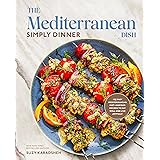Are you looking for a sustainable way to nourish your body, delight your taste buds, and potentially add years to your life? As explored in the insightful video above, the Mediterranean diet stands out not merely as a temporary eating plan, but rather as a comprehensive lifestyle embraced by vibrant cultures for generations. This approach to well-being is deeply rooted in the culinary traditions of countries bordering the Mediterranean Sea, offering a refreshing departure from restrictive diets and complex calorie counting.
This enduring lifestyle has been celebrated globally for its proven health benefits, being consistently linked to enhanced longevity and a significantly reduced risk of chronic diseases. Instead of focusing on deprivation, this eating pattern prioritizes enjoyment, community, and an abundance of fresh, whole foods. Embarking on the Mediterranean diet journey promises a pathway toward a happier, healthier future, emphasizing savoring delicious meals and fostering overall well-being.
Understanding the Mediterranean Diet: More Than Just Food
The term “diet” often evokes thoughts of strict rules and temporary weight loss goals; however, the Mediterranean diet represents something entirely different. It is understood as a holistic blueprint for living, drawing inspiration from the daily habits of people in regions like Greece, Italy, and Spain. This lifestyle is built upon foundational principles that prioritize fresh, unprocessed ingredients, mindful eating, and an active social life.
Firstly, the core philosophy centers on consuming foods that are directly sourced from the earth, emphasizing seasonal produce, legumes, and whole grains. Secondly, meals are typically prepared with simple seasonings, often featuring herbs and spices, allowing the natural flavors of the ingredients to shine. Furthermore, an integral part of this lifestyle involves sharing meals with loved ones, recognizing the profound connection between food, community, and mental well-being, elevating the act of eating into a cherished social experience.
This approach to eating is by no means a fleeting trend; its efficacy was brought to global attention by the landmark Seven Countries Study conducted in the mid-20th century. Researchers observed exceptionally low rates of heart disease among Mediterranean populations, pointing directly to their distinctive way of life and dietary habits. This seminal research highlighted that health is not merely about individual food choices but is intricately woven into cultural practices and daily routines.
The Scientific Backing for the Mediterranean Diet
The widespread acclaim for the Mediterranean diet is not solely based on anecdotal evidence or cultural practices; it is robustly supported by decades of extensive scientific research. Countless studies have illuminated the profound benefits associated with this traditional eating pattern, demonstrating its powerful protective effects across numerous aspects of health. The evidence consistently points toward remarkable health improvements that are both significant and lasting.
1. Cardiovascular Health and the Mediterranean Diet
The Mediterranean diet is particularly renowned for its exceptional contributions to heart health, often considered one of its greatest strengths. A pivotal study, known as the Predimed trial, which was conducted in Spain, provided compelling evidence of this benefit. Participants who adhered to a Mediterranean diet, especially when supplemented with extra virgin olive oil or nuts, experienced a striking reduction in the risk of major cardiovascular events. Specifically, a reduction of approximately 30% was observed in occurrences like heart attacks and strokes, a statistic that underscores its profound impact.
These protective effects are attributed to several mechanisms. Firstly, the diet actively helps in lowering levels of low-density lipoprotein (LDL) cholesterol, often referred to as “bad” cholesterol, which is a major risk factor for heart disease. Secondly, chronic inflammation, a key contributor to cardiovascular issues, is significantly reduced through the abundance of anti-inflammatory foods. Thirdly, the diet improves endothelial function, meaning the inner lining of blood vessels operates more efficiently, promoting better blood flow and overall vascular health.
2. Boosting Brain Power and Cognitive Function
Maintaining cognitive sharpness as one ages is a common concern, and the Mediterranean diet offers substantial support for brain health. The rich array of healthy fats, powerful antioxidants, and essential vitamins found within its core foods play a crucial role in neurological well-being. Ingredients such as high-quality olive oil, various nuts, and vibrant leafy greens are particularly beneficial, being consistently linked to superior cognitive performance.
Moreover, following this diet has been associated with a notably lower risk of developing neurodegenerative conditions, including Alzheimer’s disease. Some scientific investigations even propose that this eating pattern possesses the capacity to decelerate the aging process of the brain itself. The synergistic effect of these nutrient-dense foods is believed to protect neural pathways and support overall brain vitality, promoting mental clarity and resilience through the years.
3. Broader Health Benefits
The positive impacts of the Mediterranean diet extend far beyond just heart and brain health, encompassing a wide spectrum of physiological advantages. Research has consistently established connections between this eating pattern and a reduced likelihood of developing several other serious health conditions. This includes a decreased risk of type 2 diabetes, often attributed to its emphasis on whole grains and stable blood sugar management.
Furthermore, links have been identified between the Mediterranean diet and a lower incidence of certain types of cancer, likely due to its anti-inflammatory and antioxidant properties. Emerging evidence, including a recent 2025 study, has even highlighted an intriguing connection between this dietary approach and improved oral health. These benefits are not considered magical, but rather the powerful outcome of nutrient-dense, anti-inflammatory foods working cohesively to maintain optimal bodily function and prevent disease.
Key Components of the Mediterranean Diet Pyramid
Visualizing the Mediterranean diet often involves a pyramid, which effectively illustrates the proportional emphasis placed on different food groups within this eating pattern. At its expansive base are the foods that should be consumed most frequently, forming the foundation of daily meals. Moving upwards, the recommended frequency of consumption gradually diminishes, with items at the narrow apex reserved for infrequent enjoyment. This structure provides a clear and intuitive guide for making balanced food choices.
1. The Foundation: Fruits, Vegetables, and Whole Grains
At the very foundation of the pyramid lie fruits and vegetables, which are encouraged in generous quantities, spanning a wide array of colors and varieties. These nutrient powerhouses are expected to form the bulk of daily intake, appearing in vibrant salads, roasted preparations, and as natural, refreshing desserts. For instance, populations in Greece are observed to consume an average of nine servings of antioxidant-rich fruits and vegetables per day, highlighting their central role.
Just above this, whole grains, legumes, and nuts occupy a significant portion of the pyramid, serving as critical sources of fiber and sustained energy. This category includes staples like whole-wheat bread, fiber-rich brown rice, quinoa, and hearty lentils and chickpeas. Almonds and other nuts provide essential fats and proteins. These foods contribute to satiety and play a vital role in digestive health, forming the bedrock of a satisfying and wholesome diet.
2. The Heart of Healthy Fats: Extra Virgin Olive Oil
The primary source of dietary fat within the Mediterranean diet is undeniably extra virgin olive oil (EVOO), affectionately referred to as “liquid gold” by many. This versatile oil is not merely a cooking medium; it is generously used for dressings, drizzling, and even as a dip with crusty whole-grain bread. Its richness in healthy monounsaturated fats and potent antioxidants is believed to contribute significantly to its acclaimed health benefits, distinguishing it from other oils.
3. Moderate Consumption: Fish, Poultry, Dairy, and Eggs
Moving further up the pyramid, fish and seafood are recommended to be consumed at least twice weekly, emphasizing varieties rich in Omega-3 fatty acids. Salmon, sardines, and mackerel are particularly prized for their beneficial nutritional profiles, contributing to heart and brain health. Poultry and eggs are included in moderate portions, offering lean protein sources without excessive fat.
Dairy products, especially fermented varieties like yogurt, along with traditional cheeses such as feta, are also consumed in moderation. These items provide essential calcium and probiotics, supporting gut health. The key here is balance and choosing less processed, higher quality options, aligning with the overall philosophy of whole foods.
4. Sparingly Enjoyed: Red Meat and Sweets
At the very apex of the Mediterranean diet pyramid are foods that are intended for infrequent consumption, reserved for special occasions rather than daily staples. Red meat, for example, is eaten sparingly, typically once a week or a couple of times a month, in small portions. Similarly, sweets and highly processed sugary treats are viewed as occasional indulgences, reinforcing the diet’s focus on natural, unprocessed flavors.
Moreover, adequate hydration with plenty of water is consistently emphasized as crucial for overall health. Red wine is often enjoyed in moderation with meals, a practice observed in many Mediterranean cultures; however, it is never encouraged for non-drinkers, and its consumption is entirely optional. The essence of the diet lies in its balance and mindful approach to all food and drink.
Practical Steps to Embrace the Mediterranean Diet
Transitioning to the Mediterranean diet can seem daunting at first, yet its beauty lies in its adaptability and the encouragement to ease into it through simple, sustainable modifications. It is not about an abrupt overhaul, but rather a gradual evolution of eating habits that naturally become second nature. These straightforward adjustments can lead to significant improvements in health and well-being without feeling restrictive or overwhelming.
1. Swap Your Fats
One of the most impactful changes involves revising your choice of cooking fats. Traditional butter and highly processed vegetable oils should be minimized, making extra virgin olive oil your primary fat for both cooking and salad dressings. This liquid gold is packed with healthy monounsaturated fats and antioxidants, providing a delicious and healthful foundation for countless dishes.
2. Make Vegetables the Star
Rethink the composition of your plate by shifting the focus from large meat portions to abundant vegetables. Aim to have vegetables constitute at least half of your plate at every meal, creating vibrant and nutrient-dense dishes. Initiating dinner with a substantial, colorful salad is an excellent way to ensure a generous intake of essential vitamins and fiber, establishing a healthful routine.
3. Go for a Meatless Monday
Dedicate one day each week to plant-based meals, offering an excellent opportunity to explore delicious recipes centered around beans, lentils, and diverse whole grains. This practice not only expands your culinary repertoire but also contributes to environmental sustainability and introduces you to a wider array of flavors and textures that are central to the Mediterranean diet.
4. Snack Smarter
When hunger strikes between meals, reach for nourishing and wholesome snacks that align with Mediterranean principles. Instead of processed chips or cookies, opt for a small handful of unsalted nuts, a few flavorful olives, or a piece of fresh fruit. Hummus paired with crisp vegetable sticks represents another fantastic and satisfying Mediterranean-friendly snack option, providing both flavor and essential nutrients.
5. Eat Whole Grains
Make a conscious effort to switch from refined white bread, pasta, and rice to their whole-grain counterparts. Whole grains retain all parts of the grain kernel, offering a richer source of fiber, vitamins, and minerals. The increased fiber content contributes to prolonged satiety, supports healthy digestion, and helps stabilize blood sugar levels, contributing to overall well-being and energy regulation.
Navigating Common Pitfalls in the Mediterranean Journey
As with any significant lifestyle transformation, embarking on the Mediterranean diet may present a few initial challenges or common misconceptions. Being aware of these potential bumps in the road can significantly smooth your transition and ensure a more authentic and beneficial experience. Adhering to the core philosophy of this eating pattern is crucial for long-term success.
1. Avoid Processed “Mediterranean” Foods
Firstly, it is important to exercise caution with packaged foods that are marketed as “Mediterranean.” While a bag of pita chips or certain dips might appear healthy on the surface, many are highly processed and often contain unhealthy additives, excessive sodium, or refined sugars. The true spirit of the Mediterranean diet lies in whole, unprocessed ingredients, so focus on real, fresh produce, legumes, and lean proteins rather than convenience items.
2. Be Mindful of Portion Sizes
Secondly, even though the Mediterranean diet emphasizes healthy foods, portion control remains a vital consideration. Foods like extra virgin olive oil, while incredibly beneficial, are calorie-dense. Drenching food in oil, no matter how healthy, can lead to excessive calorie intake. Similarly, nuts are a fantastic source of healthy fats and protein, but a small handful constitutes a serving, not an entire bag. Mindful eating and appropriate portioning are essential for maintaining a healthy weight and overall balance.
3. Embrace the Lifestyle, Not Just the Diet
Finally, and perhaps most importantly, remember that the Mediterranean diet is not solely about what you consume; it is fundamentally a lifestyle. The cultural aspects of eating—slowing down meals, turning off distractions like phones, and sharing food with friends and family—are as impactful as the food choices themselves. Incorporating physical activity, such as a leisurely walk after dinner, further enhances the benefits. This holistic approach nourishes not only the body but also the mind and spirit, contributing to a truly vibrant and fulfilling life.











